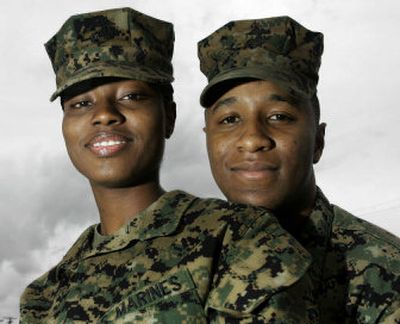Rapping wartime stress away

Some American soldiers relieve wartime stress in the weight room. Some unwind over meals. Others immerse themselves in letters from loved ones.
But for a dozen young fighters featured on a new CD, rap is the route to stress relief.
“It’s all a way of venting,” says Marine Sgt. Kisha Pollard, 22, who left California’s Camp Pendleton earlier this month for a third tour in Iraq.
“You’re stressed and you can’t be violent or do anything bad. Freestyling (rap) is a big relief, and everybody will come around and listen.”
Pollard and other amateur rappers serving in Iraq contributed their war-driven rhymes to “Voices From the Frontline,” a CD that hit stores on Tuesday.
Some hope for music careers after finishing their military service. Others simply were seeking an outlet for their thoughts on fear, family and fighting abroad.
“This ain’t for a paycheck. This ain’t for us to be known,” Army Sgt. Christopher Tomlinson says on the CD’s introduction. “This is for somebody to understand a soldier’s life.”
That’s what Joel Spielman wanted to do when he came up with the “Voices From the Frontline” concept in 2004. Inspired by a documentary about soldiers’ letters home, Spielman, president of punk label Crosscheck Records, wanted to create something similar in song.
“My vision was to have it be an audio documentary,” says Spielman, 33. “I wanted people to actually hear the voices of the soldiers.”
He posted a call for contributions on military message boards and called Army bases around the country.
Frankie Mayo of Operation AC, a nonprofit group that provides care packages to military servicepeople overseas, responded. Her son, Tomlinson, won military talent shows with his poetic skills.
With Tomlinson and Mayo’s help, notice of Spielman’s effort spread through the cyphers – rap wordplay circles – that spontaneously spring up at military camps in Iraq.
There’s ample rap talent in the war zone, says Tomlinson, who also goes by the name Prophet. Troops get together and create impromptu raps over beats played on laptop computers, CD players or Xbox consoles. Sometimes it’s a competition, other times it’s just to cope.
“We rhyme for hours upon hours about anything and everything,” Tomlinson says on the CD. “All your emotions can come out and everybody’s equal. Ain’t no ranks, ain’t no sergeants or privates. Everybody’s the exact same.”
He adds that he can express feelings in rhyme that he couldn’t in conversation.
“Rap music became my diary,” says the 24-year-old, who now works as a recruiter for the National Guard. “We’ve been given a gift to get to speak our voices for those that don’t get a chance to.”
Pollard, whose rap name is Miss Flame, speaks for female fighters in her song “Girl at War.”
“I could get shot, too, just as well as a boy,” she raps. “You look me up and down ‘cause you’re thinking I’m weak, until you see me in Iraq, patrolling the streets.”
Pollard, who joined the Marines at 19 because she “likes the uniform,” started rapping in elementary school.
She used to rhyme about “life and everything with growing up,” she says. Now she focuses on her experiences in the Middle East, with the hope of educating listeners and improving her prospects for a career in music, modeling and acting.
Marine Cpl. Michael Watts, Jr., who goes by the rap name Pyro, has been rhyming since he was 10. Back then, it was about “fancy cars, money and women,” he says. Now it’s all about Iraq.
His songs help fill in what news reporters might leave out, Watts says.
“They know what it’s like to be in Iraq but they don’t understand the brotherhood,” the 21-year-old says. “I want everyone to understand what we go through over there. We have it so easy here in the USA.”
Once the soldiers returned from Iraq, they each spent a day recording their songs at studios throughout the United States. Five percent of the proceeds from each CD will benefit Operation AC.
Spielman says the best thing about the CD is its authenticity.
“It’s as real as it gets,” he says, from the soldiers and their rhymes to the skits between songs. Dialogue and live sound from the war zone precede each of the 12 tracks.
“Voices” doesn’t glorify violence and isn’t sexist or political, Spielman says.
“This CD is not anti-war and it’s not pro-war,” he says. “It’s a journal from each of these individuals. There are some buoyant moments, but a lot of it is tragic and sad.”
Personal accounts of wartime experiences help counter negative depiction in the media, says Army spokesman Maj. Nathan Banks.
Under the first amendment, he notes, troops are free to express themselves however they like. Still, Banks says the military isn’t likely to endorse “Voices From the Frontline.”
“The wording is something we’d never support,” he says, referring to the CD’s plentiful profanities. “That’s not the image we like to portray.”
Tomlinson says he’s “proud” and “blessed” to be a part of the project.
“I know America was wavering with what their standpoint on soldiers were,” he says. “I feel like this CD gives the world a better perspective of what our life is like.”